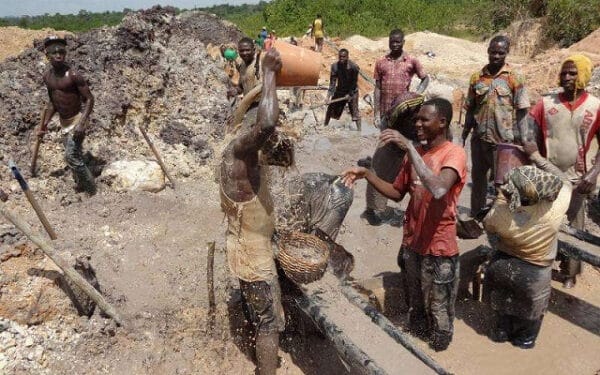The African Commission on Human and Peoples’ Rights (ACHPR) has declared Ghana‘s illegal mining crisis, popularly known as galamsey, a human rights emergency, citing entrenched political complicity and compromised security enforcement.
The warning followed a four-day Promotion Mission to Ghana from September 29 to October 2, 2025, during which Commissioners responsible for extractive industries, women’s rights, torture prevention, detention, and socio-economic rights assessed the country’s human rights situation and the impact of extractive activities.
Commissioner Janet Ramatoulie Sallah-Njie, who oversees the promotion of human rights in Ghana and serves as Special Rapporteur on the Rights of Women in Africa, said galamsey had become one of the gravest threats to Ghana’s stability and human rights commitments. She shared the delegation’s preliminary findings at a press conference in Accra.
The Commission acknowledged Ghana’s progress in justice, security, and social protection reforms but warned that galamsey had reached “alarming proportions,” devastating rivers, streams, and farmlands, while threatening public health, food security, and livelihoods. The mission noted a social crisis where children in mining communities abandon schools to engage in hazardous mining, exposing themselves to illiteracy, exploitation, and long-term health risks from chemical pollution.
The ACHPR delegation also highlighted accounts of trafficking and sexual exploitation in mining zones, with women and girls facing reproductive health risks and abuse. The complicity of political actors and some security personnel deployed to curb the menace was cited as a major factor undermining interventions, eroding public trust, and allowing galamsey to thrive despite repeated crackdowns.
To tackle the crisis, the Commission urged Ghana to adopt a coordinated multi-sectoral approach, including declaring key mining regions as security zones, launching an independent anti-corruption investigation into political and security actors benefiting from illegal mining, and restoring confidence in state-led interventions.
The recommendations extended to socio-economic solutions such as an emergency support fund for cocoa farmers, rehabilitation of degraded lands and water bodies, independent health impact assessments, immediate medical interventions for mercury-exposed communities, and scholarships to reduce dropout rates in mining areas.
The mission further called for sustainable alternatives, including vocational training, youth employment programmes, and the formalisation of small-scale mining, with a focus on vulnerable groups such as migrant head porters (kayayei).
“This is not merely an environmental issue; it is a human rights crisis undermining the dignity, safety, and future of millions of Ghanaians,” Commissioner Sallah-Njie declared.
The full mission report will be presented to the African Commission for adoption before being submitted to the Government of Ghana, but the delegation stressed that swift, decisive action was urgently required.





















